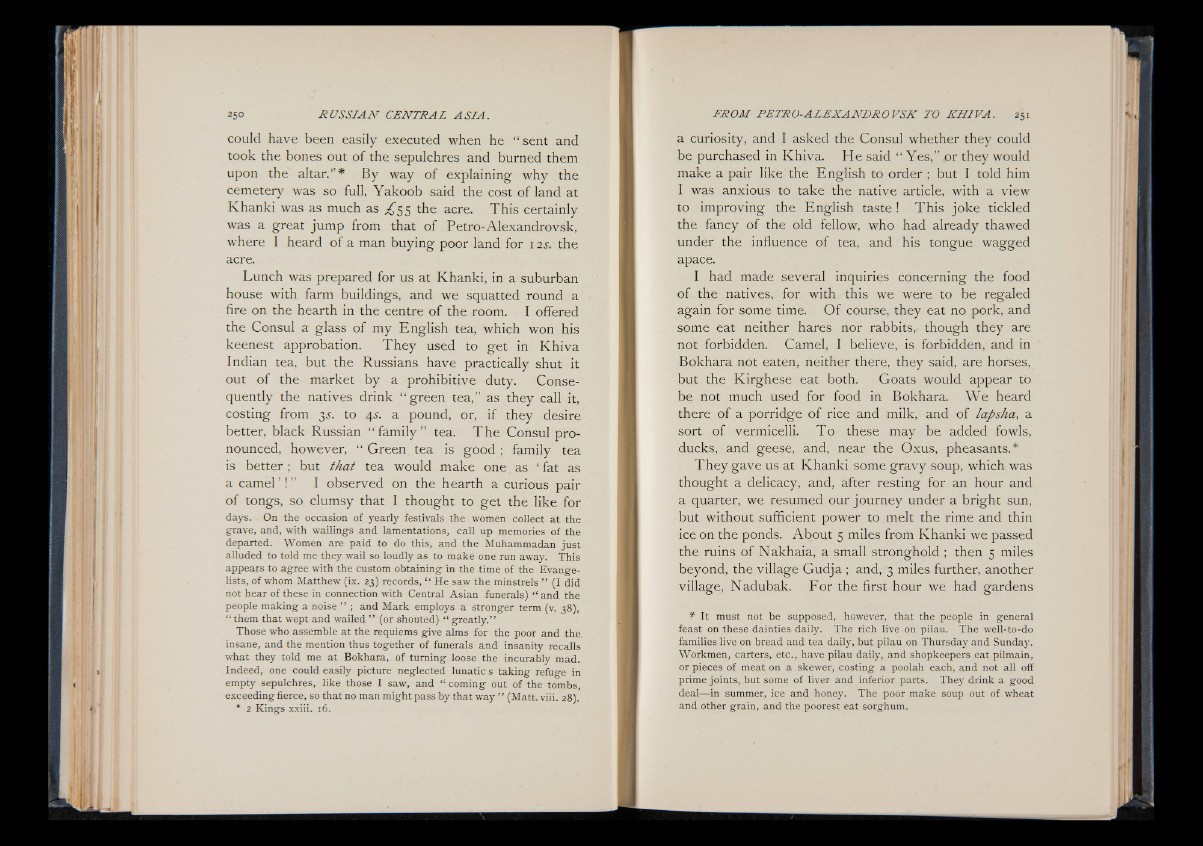
could have been easily executed when he “ sent and
took the bones out of the sepulchres and burned them
upon the altar.” * By way of explaining why the
cemetery was so full, Yakoob said the cost of land at
Khanki was as much as ^"55 the acre. This certainly
was a great jump from that of Petro-Alexandrovsk,
where I heard of a man buying poor land for 12s. the
acre.
Lunch was prepared for us at Khanki, in a suburban
house with farm buildings, and we squatted round a
fire on the hearth in the centre of the room. I offered
the Consul a glass of my English tea, which won his
keenest approbation. They used to get in Khiva
Indian tea, but the Russians have practically shut it
out o f the market by a prohibitive duty. Consequently
the natives drink “ green tea,” as they call it,
costing from 3s. to 4s. a pound, or, if they desire
better, black Russian “ family” tea. T h e Consul pronounced,
however, “ Green tea is good ; family tea
is better ; but that tea would make one as I fat as
a camel ’ ! ” I observed on the hearth a curious pair
of tongs, so clumsy that I thought to get the like for
days. On the occasion of yearly festivals the women collect at the
grave, and, with wailings and lamentations, call up memories of the
departed. Women are paid to do this, and the Muhammadan just
alluded to told me they wail so loudly as to make one run away. This
appears to agree with the custom obtaining in the time of the Evangelists,
of whom Matthew (ix. 23) records, “ He saw the minstrels ” (I did
not hear of these in connection with Central Asian funerals) “ and the
people making a noise ” ; and Mark employs a stronger term (v. 38),
“ them that wept and wailed ” (or shouted) “ greatly.”
Those who assemble at the requiems give alms for the poor and the,
insane, and the mention thus together of funerals and insanity recalls
what they told me at Bokhara, of turning loose the incurably mad.
Indeed, one could easily picture neglected lunatic s taking refuge in
empty sepulchres, like those I saw, and “ coming out of the tombs,
exceeding fierce, so that no man might pass by that way ” (Matt. viii. 28).
* 2 Kings xxiii. 16.
a curiosity, and I asked the Consul whether they could
be purchased in Khiva. He said “ Y e s ,” or they would
make a pair like the English to order ; but I told him
I was anxious to take the native article, with a view
to improving the English taste ! This joke tickled
the fancy of the old fellow, who had already thawed
under the influence of tea, and his tongue wagged
apace.
I had made several inquiries concerning the food
of the natives, for with this we were to be regaled
again for some time. O f course, they eat no pork, and
some eat neither hares, nor rabbits,- though they are
not forbidden. Camel, I believe, is forbidden, and in
Bokhara not eaten, neither there, they said, are horses,
but the Kirghese eat both. Goats would appear to
be not much used for food in Bokhara. We heard
there of a porridge of rice and milk, and of lapsha, a
sort of vermicelli. T o these may be added fowls,
ducks, and geese, and, near the Oxus, pheasants.*
They gave us at Khanki some gravy soup, which was
thought a delicacy, and, after resting for an hour and
a quarter, we resumed our journey under a bright sun,
but without sufficient power to melt the rime and thin
ice on the ponds. About 5 miles from Khanki we passed
the ruins of Nakhaia, a small stronghold ; then 5 miles
beyond, the village Gudja ; and, 3 miles further, another
village, Nadubak. For the first hour we had gardens
It must not be supposed, however, that the people in general
feast on these dainties daily. The rich live on pilau. The well-to-do
families live on bread and tea daily, but pilau on Thursday and Sunday.
Workmen, carters, etc., have pilau daily, and shopkeepers eat pilmain,
or pieces of meat on a skewer, costing a poolah each, and not all off
prime joints, but some of liver and inferior parts. They drink a good
deal—in summer, ice and honey. The poor make soup out of wheat
and other grain, and the poorest eat sorghum.